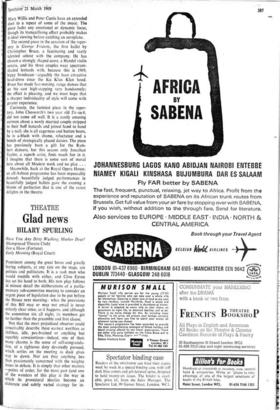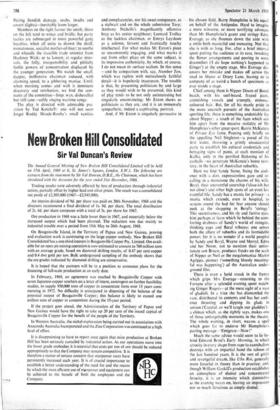THEATRE
Glad news
HILARY SPURLING
Have You Any Dirty Washing, Mother Dear? (Hampstead Theatre Club) Just a Show (Fortune) Early Morning (Royal Court)
Prominent among the great bores and greatly boring subjects, at any rate on the stage, are politics and politicians. It is a rash man who would meddle with either, and Clive Exton has set his hand to both. His new play follows in' minute detail the deliberations of a parlia- mentary sub-committee meeting to consider an urgent piece of legislation due to be put before the House next morning: what the provisions of this Bill may or may not entail is never entirely clear since, as it happens, and although the committee sits all night, its members get no further than the preamble and first clause.
Not that the most prejudiced observer could conceivably describe these earnest worthies as shiftless, idle, pea-brained or anything but superbly conscientious--indeed, one of their many charms is the sense of self-congratula- tion, of a righteous duty devotedly pursued, which settles on the meeting as dusk gives way to dawn. Nor are they anything less than passionately concerned with the weighty issues in debate. It is simply that other matters —points of order, for the most part (and one of the wonders of this play is the way in which its procedural niceties become an elaborate and subtly varied strategy for in- rt flicting fiendish damage, snubs, insults and covert slights)—inevitably loom larger.
Members on the right favour the smirk, those on the left tend to wince and bridle; but party tactics are submerged in more powerful gang loyalties, when all unite to drown the shrill, monotonous, socialist mother-of-four; to soothe and wheedle the irascible trade unionist from Hackney Wick; or to lament, at regular inter- vals, the folly, irresponsibility and pitifully feeble powers of concentration displayed by the younger generation. We watch the small, dapper, inoffensive chairman reduced, with alarming speed, to a gibbering maniac. Until, when morning comes and with it imminent discovery and retribution, we find the rem- nants of the committee—limp, wan, dishevelled but still sane—softly singing wartime songs.
The play is directed with admirable pre- cision by Ted Kotcheff : one will not soon forget Roddy Maude-Roxby's small vanities and complacencies, nor his sweet composure, as a stalwart and on the whole submissive Tory; Anthony Nicholls's magnificently offensive bray as his senior neighbour; Leonard Trolley as the luckless chairman, or Emrys Leyshom as a solemn, fervent and frantically touchy intellectual. For what makes Mr Exton's piece so uncommonly engaging, and what marks it out from other plays on the same subject, is its impressive authenticity, by which, of course, I do not mean its surface realism. In this sense —and by comparison with, say, Number Ten, which was replete with meticulously faithful detail—it is hopelessly inaccurate. The trouble is that, by presenting politicians by and large as they would wish to be presented, this kind of play tends to be not only uninteresting but singularly unconvincing; Mr Exton shows us politicians as they are, and it is an immensely sympathetic, indeed a captivating, portrait.
And, if Mr Exton is singularly persuasive in his chosen field, Barry Humphries is his equal on behalf of the Antipodes. Hard to imagine a more winsome, or more terrifying advocate than Mr Humphries's gaunt and stringy Edna Everage, as she flounces down the aisle with a smile both masterful and menacing. Not that she is with us long. For, after a brief interval spent putting the audience at its ease, tweaking the flower arrangements and peering in some discomfort CI do hope nothing's happened to Ginger') at the empty stage, Mrs Everage dis- covers her mistake . and makes off across the road to Mame at Drury Lane, leaving us in company of as weird a bunch of specimens as ever strode a stage.
Chief among them is Nipper Dixon of Bondi beach, with - his surf-board, frayed jeans, astonishing vowels and crumply, mimosa- coloured hair. But, for all his manly pride in the more uncouth pursuits of the Australian sporting life, there is something undeniably fey about Nipper: a touch of the faun which sets him apart from the massive stolidity of Mr Humphries's other great sport. Barrie McKenzie of Private Eye fame. Pausing only briefly on the appalling Neil Singleton—a pseud of the first water, throwing a grimly unsuccessful party to establish his cultural credentials and betraying signs of panic, at each mention of Kafka, only in the petrified flickering of his eyeballs—we penetrate McKenzie's home terri- tory, in the heart of Australian suburbia.
Here we find Sandy Stone, fixing the audi- ence with a dim, expressionless gaze and re- calling in a monotone the charms of his wife, Beryl, their uneventful courtship (`close-ish but not close') and other high spots of an even less eventful life. Sandy has a mania for privacy—a mania which extends, even in hospital, to screens round the bed for fear anyone should peek at the shopping in Beryl's 'stringy' This secretiveness, and his sly and furtive eyes, hint perhaps at fears which lie behind the corn- forting drabness of Sandy's world of stringies, thinking caps and floral tributes; one .senses both the allure of suburbia and its formidable power; for it is no wonder if a world peopled by Sandy and Beryl, Wayne and Merryl, Edna and her Norm, not to mention their unfor- tunate son Brucie, produces freaks on the scale of Nipper or Neil or the megalomaniac Martin Agrippa, pioneer ('something bloody meaning- ful was happening') of the Australian under- ground film.
There is even a lurid streak in the frenzy which grips Mrs Everage—returning to the Fortune after a splendid evening spent watch- ing Ginger Rogers—at the mere sight of a vase of gladioli. In a trice she has dismantled the vase, distributed its contents and has her audi- ence thrusting and dipping its glads in unison ('Careful, or we'll tangle our gladdies): a climax which, as she rightly says, makes one of those unforgettable moments in the theatre. The whole evening, in short, weaves a spell which goes far to endorse Mr Humphries's parting message—'Emigrate—Now!'
Much the same advice would seem to lie be- hind Edward Bond's Early Morning, in which atrocity in every shape from rape to cannibalism destroys with an impartial hand the taboos of the last hundred years. It is the sort of grisly and revengeful dream, like Ubu Rol, generally more forceful in theory than in practice; and, though William Gaskill's production establishes an atmosphere of dismal and concentrated ferocity, it is an intensity which diminishes as the evening wears on, leaving an impression not so much ferocious as simply dismal.











































 Previous page
Previous page